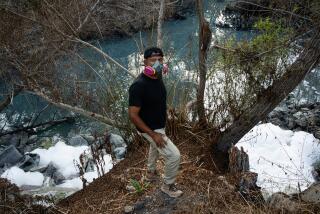ORANGE COUNTY PERSPECTIVE : Blanket Impact
The Irvine City Council has decided to ask a question that ought to interest officials throughout Orange County: Even if all the high-tech firms in a city individually meet legal standards for toxic emissions, what is the collective effect on citizens of the aggregate, if legal, amount still being emitted?
This is not a question often posed these days. Indeed, the new study is generally thought to be a first in the nation. But it should not be surprising that Irvine is out in front on the environment. Its ordinance to reduce chlorofluorocarbons, and its law requiring industries to report hazardous material use, have been copied elsewhere.
The study will gather pollution data from federal, state and regional agencies on toxic chemicals released in and around Irvine. For example, the U.S. Environmental Protection Agency found that 500 Irvine-based companies reported emissions of more than 2 million pounds of toxic pollutants in 1988.
The study’s findings will be used to construct a model of emission patterns over the city and to estimate the potential exposure. This research is so new that the city’s environmental program administrator worries that there are no members on the city’s scientific advisory committee who know much about toxic chemical emissions and that methods of study are unproved. But Irvine should press ahead and find out what it can. Even if it’s only early research, citizens deserve to know all they can about the ethylene oxide, dichloromethane and other exotic substances they are living with.
More to Read
Sign up for Essential California
The most important California stories and recommendations in your inbox every morning.
You may occasionally receive promotional content from the Los Angeles Times.










